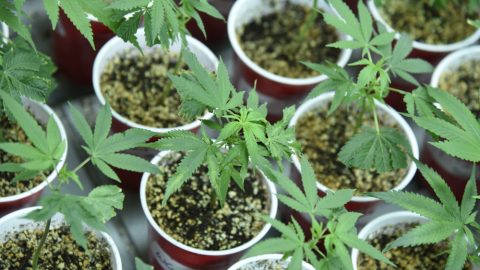What is CBD?
Cannabidiol (CBD) is a naturally occurring compound found in highest concentrations in the resin-covered flowers of the cannabis plant. CBD is one of over 100 chemical compounds known as cannabinoids. Tetrahydrocannabinol (THC) is the main intoxicating cannabinoid found in cannabis causing the “high” that’s often associated with marijuana. However, unlike THC, CBD is not intoxicating. This makes CBD an appealing option for those looking for relief from pain and other symptoms without mind-altering effects.
What Does the Research Show?
Cannabis has been known to treat pain for nearly 5000 years. Recently, scientists have discovered that certain compounds of cannabis, including CBD, are responsible for its pain-relieving effects.
The human body contains a specialized system of cell-signaling called the endocannabinoid system (ECS). The ECS is involved in regulating a variety of functions in addition to pain including: mood, memory, sleep, appetite, and immune system response. Our bodies produce endocannabinoids, which signal certain functions within our cells in an attempt to restore a biologic balance, known as homeostasis. Cannabinoids, such as CBD, are believed to assist the body’s ECS achieve this balance.
Studies have shown that CBD may help reduce pain by impacting endocannabinoid receptor activity. A 2007 study concluded that CBD has “substantial” anti-inflammatory effects in a rodent model of nerve and inflammatory pain. Even CBD applied to the skin has been shown to reduce inflammation and arthritis pain in a 2016 animal study.
Anxiety and depression are common mental health disorders which can have devastating impacts on a person’s overall health and well-being. And some medications frequently prescribed for anxiety and depression often cause side effects such as drowsiness, sexual dysfunction, dizziness, and headache. Some of these medications can even be habit-forming. CBD oil appears to show promise as a treatment for both anxiety and depression.
One of the endocannabinoids our body produces is called anandamide, which translated from Sanskrit means “internal bliss.” Research has shown CBD blocks the enzyme that breaks down anandamide. Thus, CBD tends to increase the level of this “bliss molecule.”
A 2014 study from Brazil found CBD demonstrated anti-anxiety and antidepressant effects in animal models. Another study from Brazil found CBD significantly reduced anxiety in people undergoing a simulated public speaking test.
In addition, a 2019 study examined whether a 25mg capsule of CBD per day would improve anxiety and/or sleep. The study involved a total of 72 adults, including 47 with anxiety and 25 with poor sleep. The researchers found within one month, anxiety had decreased in more than 79% and sleep improved in nearly 67% of the respective study subjects.
Furthermore, there is evidence that CBD may be beneficial in the treatment of post-traumatic stress disorder (PTSD). A small 2019 study found 91% of people treated with CBD for 8 weeks experienced a decrease in their PTSD symptoms by an average improvement of 28% in their symptom score.
Acne treatment appears to be another promising use for CBD. Acne results from inflammation in the skin’s hair follicles. This occurs indirectly through over-production of the oily secretion (sebum) by the cells which produce it in the skin (sebocytes). A 2014 study showed CBD suppressed inflammation and inhibited sebum production by human sebocytes.
Heart disease is the leading cause of illness and death in diabetics. The results of one preclinical study published in the Journal of the American College of Cardiology in 2010 “strongly suggest that it [CBD] may have great therapeutic potential” in the treatment of diabetic complications and perhaps other cardiovascular diseases. This therapeutic potential is thought to occur by lowering oxidative stress, inflammation, scarring, and cell death.
Finally, research suggests long-term use of CBD may have a potential benefit in the treatment of Alzheimer’s disease (AD). A 2014 study found 8 months of daily CBD protected brain cells by blocking oxidative damage and inflammation. Researchers concluded CBD appeared to prevent memory problems in an animal model of Alzheimer’s disease. And similarly, a 1998 rodent study found that CBD displayed greater brain-protecting antioxidant activity than either vitamins C or E.
Is CBD Safe to Take?
CBD appears to be very safe. In fact, in June 2018, the FDA approved the use of CBD for children in two severe seizure syndromes. And CBD doesn’t slow the breathing center of the brain the way some prescription pain killers, like opioids do.
According to the World Health Organization, “CBD is generally well tolerated with a good safety profile.” A 2011 review of the side effects and safety of CBD found that, “chronic use and high doses up to 1,500 mg per day of CBD are reportedly well tolerated in humans.”
There are very few known side effects of CBD. When side effects do occur, however, they may include fatigue, diarrhea, or changes in appetite.
Healthcare providers who use CBD to treat their adult patients commonly start with a dose of 20 – 40 mg per day. The dose is then gradually increased or decreased depending on the relief obtained and any possible side effects. It is especially important if you’re taking other medicines to consult with your healthcare provider before starting CBD.
Can CBD cause a positive drug test?
For a CBD product to be considered legal according to the 2018 Farm Bill, it must contain 0.3% or less THC on a dry weight basis. This small amount of THC, in theory, means there is very little chance that it will result in a positive urine drug test. In addition, positive urine drug tests go through a confirmatory test before being reported as positive. And the confirmatory test is usually too specific to result in a positive test from a legal CBD product. With that being said, it may not be worth the risk to take a CBD product with any THC if a positive urine drug test is potentially a problem. Instead, a CBD isolate product with zero THC may be a better option.
What’s the Bottom Line with CBD?
CBD oil has been studied for its potential role in easing symptoms of many common health issues including: anxiety, depression, acne, and heart disease. It’s necessary to keep in mind that there’s still much to learn about CBD. However, results from a number of preclinical studies suggest that CBD may provide a safe, natural, and powerful treatment for many health conditions. As the cannabis industry grows, CBD research should continue to expand too. And many experts believe that a large number of current, suspected health benefits will be further supported with additional research and that new therapeutic uses for CBD will be discovered.
References:
Hill K et al; Cannabis and Pain: A Clinical Review; Cannabis and Cannabinoid Research; 2017; 2(1): 96 – 104.
Costa B et al; The non-psychoactive cannabis constituent cannabidiol is an orally effective therapeutic agent in rat chronic inflammatory and neuropathic pain; European Journal of Pharmacology; 2007 Feb; 556(1-3): 75 – 83.
Hammell D et al; Transdermal cannabidiol reduces inflammation and pain-related behaviours in a rat model of arthritis; European Journal of Pain; 2016 July; 20(6): 936 – 948.
Shannon S et al; Cannabidiol in Anxiety and Sleep: A Large Case Series; The Permanente Journal; 2019; 23: 18 – 41.
Russo E; Taming THC: potential cannabis synergy and phytocannabinoid-terpenoid entourage effects; British Journal of Pharmacology; 2011 Aug; 163(7): 1344 – 1364.
Bergamaschi M et al; Safety and side effects of cannabidiol, a Cannabis sativa constituent; Current Drug Safety; 2011 Sep; 6(4): 237 – 249.
https://www.congress.gov/bill/115th-congress/house-bill/5485
de Mello Schier A et al; Antidepressant-like and anxiolytic-like effects of cannabidiol: a chemical compound of Cannabis sativa; CNS and Neurological Disorders Drug Targets; 2014; 13(6): 953 – 960.
https://www.scripps.edu/newsandviews/e_20010813/cravatt1.html
Linares I et al; Cannabidiol presents an inverted U-shaped dose-response curve in a simulated public speaking test; Brazilian Journal of Psychiatry; 2019 Jan-Feb; 41(1): 9 – 14.
Elms L et al; Cannabidiol in the Treatment of Post-Traumatic Stress Disorder: A Case Series; Journal of Alternative and Complementary Medicine; 2019 Apr; 25(4): 392 – 397.
Russo E; Cannabinoids in the management of difficult to treat pain; Therapeutics and Clinical Risk Management; 2008 Feb; 4(1): 245 – 259.
Cheng D et al; Long-Term Cannabidiol Treatment Prevents the Development of Social Recognition Memory Deficits in Alzheimer’s Disease Transgenic Mice; Journal of Alzheimer’s Disease; 2014; 42: 1383 – 1396.
Rajesh M et al; Cannabidiol attenuates cardiac dysfunction, oxidative stress, fibrosis, inflammatory and cell death signaling pathways in diabetic cardiomyopathy; Journal of the American College of Cardiology; 2010 Dec; 56(25): 2115 – 2125.
Hampson A et al; Cannabidiol and (−)Δ9-tetrahydrocannabinol are neuroprotective antioxidants; Proceedings of the National Academy of Sciences of the United States of America; 1998 Jul; 95(14): 8268 – 8273.
https://www.who.int/medicines/access/controlled-substances/CannabidiolCriticalReview.pdf
This content is for informational purposes only. It is not intended to take the place of medical advice or treatment from a personal physician. All readers of this content should consult their physician or qualified healthcare professional regarding specific health questions, especially those taking prescription or over-the-counter medications. CannaGlobe does not take responsibility for possible health consequences of any person reading and/or following this informational content.


